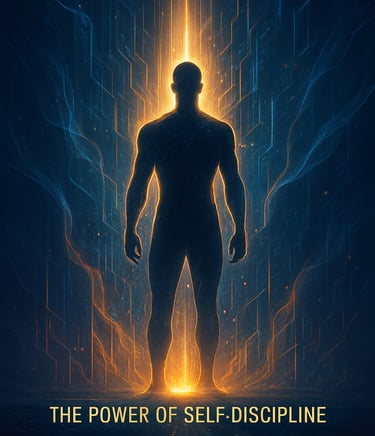
The Power of Self-Discipline – Building Strength Beyond Motivation
There comes a moment in everyone’s journey when motivation fades. The excitement that once pushed us forward begins to disappear, and what remains is a quiet resistance—the kind that whispers, “Maybe tomorrow.” This is the space where dreams begin to fade and promises lose strength. But for those who understand the deeper rhythm of human action, this moment is not the end—it’s the true beginning. Because beyond motivation lies something greater, something quieter but infinitely more powerful: self-discipline.
11/23/2025



The Power of Self-Discipline – Building Strength Beyond Motivation
There comes a moment in everyone’s journey when motivation fades. The excitement that once pushed us forward begins to disappear, and what remains is a quiet resistance—the kind that whispers, “Maybe tomorrow.” This is the space where dreams begin to fade and promises lose strength. But for those who understand the deeper rhythm of human action, this moment is not the end—it’s the true beginning. Because beyond motivation lies something greater, something quieter but infinitely more powerful: self-discipline.
Motivation is emotional; it comes and goes like waves. Self-discipline is elemental; it stays steady like the shore. It does not rely on feelings, moods, or external circumstances. It is built through awareness—the kind that happens in those seconds when you decide to act even when you don’t feel like it. You wake up and want to sleep for five more minutes. Your mind says, “Just a little longer.” That’s the moment. The second where your choice defines your future. The one who acts anyway—the one who gets up, the one who moves—has just won a battle no one else can see. That’s the seed of greatness: a small invisible victory repeated over time.
Think about anyone who has achieved mastery in any field—artists, athletes, scientists, teachers, entrepreneurs. What separates them from the rest is not extraordinary talent; it’s consistency in the seconds that count. When others delay, they decide. When others stop, they continue. They have trained their minds to move beyond the feeling of “wanting” into the habit of “doing.” The beauty of self-discipline is that it rewires your brain to respond to commitment rather than comfort. Every time you act against the urge to procrastinate, you strengthen a mental muscle that starts to protect your purpose.
There’s an old saying that goes, “Motivation gets you started, but discipline keeps you going.” That’s the essence of transformation. You cannot always depend on feeling inspired. The world will not always give you reasons to move forward. But if your inner compass is built on discipline, you’ll keep walking even when the path is dark. You’ll learn to trust effort more than emotion. You’ll begin to act not because you feel ready, but because you have trained your mind to choose growth over ease.
Imagine a simple morning. The alarm rings. Your body resists. You are at the edge of choice. In that split second, two versions of you exist—the one that listens to the body’s comfort and the one that listens to the mind’s purpose. Discipline is choosing the second version of yourself. You act not because you enjoy the discomfort but because you understand that the future you desire depends on this exact moment. Every day, life offers us hundreds of these micro-decisions. And every time we act with awareness, we turn ordinary seconds into steps of transformation.
The “Seconds-Theory” works here beautifully. Those first few seconds of resistance are not your enemy—they are your opportunity. The mind gives you a small window where change can begin. If you act within that moment, you break the inertia that holds you back. Self-discipline is simply the habit of using that window again and again until it becomes your nature. Eventually, what was once hard becomes automatic. Waking early, exercising, studying, working with focus—all of these actions become effortless when you stop negotiating with your emotions and start listening to your decisions.
Let’s take an example. Imagine a writer who wants to finish a book. The first week, motivation is high. Words flow easily. But then life interferes—fatigue, distractions, self-doubt. This is where most people stop. But the disciplined writer continues. They write a few lines even when they don’t feel creative. They sit with the blank page, refusing to surrender. Over time, those small moments accumulate, and what seemed impossible becomes complete. The difference is not genius—it’s the decision to show up regardless of mood. That’s the invisible power of self-discipline: it turns ordinary effort into extraordinary achievement.
Self-discipline also reshapes your relationship with time. The undisciplined mind views time as something to be managed, controlled, or filled. The disciplined mind sees time as sacred. Every second becomes a choice—either invested or wasted. When you realize how many seconds in a day are spent on distractions, you begin to understand why some people build legacies while others build excuses. The disciplined person respects the small moments. They know that great change happens not in giant leaps but in consistent seconds of intention.
In today’s world, where instant gratification dominates everything, discipline has become rare—and therefore, powerful. We live in an era where dopamine replaces dedication, where scrolling replaces striving, where shortcuts replace patience. Yet, those who quietly practice discipline create real impact. They are not shouting their progress online—they are living it offline. They don’t need to tell others they’re working; their results speak. Their life becomes proof that structure is stronger than speed.
There’s another truth about self-discipline—it’s not about punishment or denial. It’s about alignment. It means living according to your purpose rather than your impulse. When you’re disciplined, you’re not restricting yourself—you’re freeing yourself from chaos. You stop being a slave to temporary desires. You stop chasing comfort and start chasing clarity. You stop reacting to every emotion and start responding to your goals. In this way, discipline is the highest form of self-respect. It’s saying to yourself, “I value my future more than my feelings.”
Let’s imagine another scenario. You’ve decided to start a fitness journey. The first few days, energy is high. But then, one day you don’t feel like going to the gym. You tell yourself it’s just one day. But that one day becomes three, and soon you’re back to zero. What happened? The decision was delayed in the moment. You lost the “second” of action. But the disciplined version of you doesn’t wait for the perfect mood. You move because movement itself creates motivation. You know that action fuels emotion—not the other way around. That’s how the cycle of success begins.
Self-discipline doesn’t require perfection—it requires persistence. You will fall. You will get distracted. You will have days when your energy feels broken. But discipline teaches you to rise faster. It teaches you that consistency is more important than intensity. You don’t have to win every day; you just have to show up every day. Over time, small wins compound into unshakable strength.
Ancient philosophy also spoke about this. In the Bhagavad Gita, Lord Krishna says, “One must lift oneself by one’s own mind.” This means the true battle is within—the struggle between your higher self and your habitual self. Discipline is the bridge between them. When you master your impulses, you become the master of your destiny. Similarly, ancient Stoics like Marcus Aurelius taught that the disciplined mind is free because it is not ruled by emotion. The message across all ages remains the same: freedom is not found in doing what you want, but in training yourself to do what is right.
There is a quiet dignity in self-discipline. It doesn’t demand applause or attention. It’s often lonely, silent, unseen. But when the results come, they shine brighter than any moment of motivation could ever give. The athlete who trains in the dark becomes a champion under the lights. The student who studies when others scroll becomes a leader when others follow. The entrepreneur who stays consistent during dry months becomes the story everyone admires. What all of them share is this: they understood that self-discipline is not a punishment—it’s preparation.
You can begin this journey right now. You don’t need a perfect plan. You don’t need to wait for Monday or New Year or the next motivational video. You just need to act within this second. That’s it. This moment can be your turning point. Choose one small thing and follow through—drink water when you promised, write one paragraph, make that call, finish that task. Each small act becomes a signal to your brain that you are in control. Each second you claim back from hesitation becomes a step toward the disciplined life.
Self-discipline is the quiet architect behind every success story. It’s the invisible thread that ties effort to excellence. And the more you practice it, the freer you become. Because when you stop being controlled by mood or distraction, you gain the ultimate power: the power to choose. You realize that every great transformation begins not in grand plans but in small seconds—those sacred moments when you decide to move forward despite resistance.
So today, as you finish reading this, don’t wait for inspiration. Don’t wait for permission. Act. Even one small step is enough. Because the truth is simple yet profound: the strongest people are not those who always feel ready—they are the ones who act even when they don’t. And that is what self-discipline really is—the art of moving when the world is still, of choosing purpose over comfort, of becoming the person your dreams require you to be.
Inspiration
Empowering learners to achieve their fullest potential.
Growth
Success
© 2025. All rights reserved.
Mrs. Sadhana Ware
